Finding the perfect solution to remove sediment and contaminants from your well water can be tricky. Well water is notoriously very high in sediment, iron, and other total dissolved solids that can cause harmful effects to your health and home.
Luckily for us, more companies are gearing their products toward effectively filtering well water and the contaminants that come with it.

Because well water is so high in sediment and heavy igneous traits, many homes rely on bottled water for drinking and hard, contaminated water for everything else. Thankfully, there is no longer a need to settle for this lifestyle. Now dozens of different filtering products are specifically designed to remove harmful toxins from well water.
Throughout this guide, I will review some of my favorite sediment filters for well water, along with a handy buying guide that should point you in the right direction. Not all well water is created the same; your water’s unique traits and characteristics will guide us to the best sediment water filter for you.
Recommended Sediment Filter for Well Water |
|||
|---|---|---|---|
Aquasana Whole House Sediment Filter System |
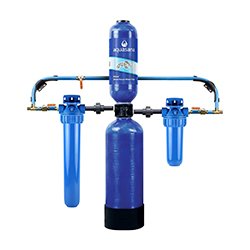
BEST WHOLE HOUSE |
|
View Latest Price |
iSpring WSP-50SL Spin Down Sediment Water Filter |

BEST SPIN DOWN |
|
View Latest Price |
EcoPure EPWHE Sediment Water Filter |
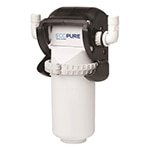
BEST VALUE |
|
View Latest Price |
Best Sediment Filter for Well Water Reviews
(Featured) – SpringWell Spin-Down Sediment Filter
Everything you need to install the system is included in the base package. The filter life competes with the best in the business, and if you take care of your system and change the filters on time, you will be able to enjoy the water from your Aquasana for over ten years.
The additional package options will allow you to add a water conditioner and even add a UV-Light option to help reduce more bacteria.
1. iSpring WSP-50SL Spin Down Sediment Water Filter

Highlighted Features
The iSpring pre-sediment filter is a great option for those dealing with a ton of rock, rust, and other solid contaminants.
It features a stainless-steel fine mesh barrier that grabs any impurities before the water reaches the spin-down filter. The spin-down filter is easy to use and is a great feature to ensure that your water filter is working at maximum capacity.
By redirecting the valve to be in line with the filter, the water will flow and clean the filter from top to bottom. This process will elongate the filter life and allow sediment-free water for months.
If these filters are not flushed every now and then, you will see a decrease in filter effectiveness. Luckily, the iSpring pre-sediment filter handles this dirty job for you.
What We Like:
What We Didn’t Like:
Other Notable iSpring Sediment Filters
2. Culligan WH-HD200-C Whole House Sediment Water Filter
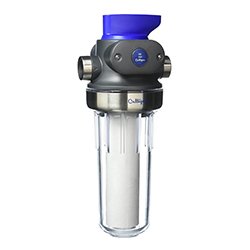
Highlighted Features
Growing up, I had a Culligan water filter tank in my family kitchen. It was my first experience with water filtration, and I have trusted them since those days many years ago.
If you are on the search for a reliable sediment water filter made by a company with a decades-long reputation, Culligan should be on your list. This whole-home sediment filter is designed to be extremely strong but easily installed by any homeowner.
The first thing you will notice is that there is no mounting bracket. The bracket is embedded into the filter housing. This was nice for installation because it allows the filter to be installed virtually anywhere on the waterline.
There is a blue valve on the top of the filter that you can turn to select where you want the water to go. It is as easy as turning that valve if you want the water to bypass the filter for any reason. The filter does a great job removing sediment and other hard metal particles.
If you want to install a filter that will eliminate harmful toxins and takes less than an hour to install, investigate this one.
What We Like:
What We Didn’t Like:
3. EcoPure EPWHE No Mess Home Water Sediment Water Filter

Highlighted Features
The EcoPure whole-house sediment filter is of great value. This system is compact and affordable but packs a punch. The encapsulated filter chamber is an excellent design, it allows filters to be changed without touching the filter media.
This allows you to keep your hands clean when removing the filter and will not add any unwanted contaminants to the filter while adding one.
The filter life of 6 months is solid for a sediment filter and falls in line with many comparable products and their filter longevity. This filter is certified by NSF/ANSI for several different standards and by simply having this stamp of approval, it gives you peace of mind that you are getting a great product.
We loved several factors about the EcoPure sediment filter, and many of them will benefit all homes.
What We Like:
What We Didn’t Like:
4. Rusco 1-1/2” Spin Down Separator Sediment Water Filter

Highlighted Features
Rusco has been providing consumers with sediment-free water since the 70s. It is easy to see why. When finding the most versatile and adaptable sediment filter, look no further. This small, light, and compact sediment filter is designed to remove sediment and sand from not just well water but plenty of other water sources. It weighs less than 2 pounds and can work with any water line.
One everyday use for this system is for gardening and farming. Most times, hose water is high in metal, sand, rust, and solids. Installing a spin-down filter like the Rusco will add valuable minerals to your plants and farming needs.
If you rely on abnormal water supplies or maybe even have a farm, this filter was designed with you in mind. It can be installed quickly into any garden hose, lake water, and well water supply. It removes not only sediment but handles metal, rust, and other common contaminants with the best of them.
What We Like:
What We Didn’t Like:
5. Transparent Big Blue Housing Water Filter System
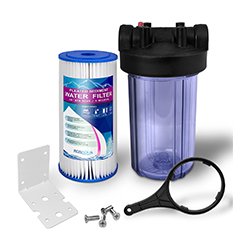
Highlighted Features
Simply put, the Big Blue Filter Housing is a tank. I have no worries that this thing will break or have any durability issues.
The polypropylene is super strong and shatter-resistant, which is great for installing and uninstalling this system.
The included mounting hardware is just as robust and easily attaches to a wall with four included screws. The brass inlet and outlet valves are a nice touch, too. Many comparable systems use plastic for the inlet/outlet valves that tend to leak. Plus, the brass is suitable for the water!
Regarding the filtering capability of the Big Blue, the pleated filter technology does a great job capturing sediment and other hard objects.
The pleats will trap rock, sand, dust, and more in the folds, while the water that does get let through, will go through a 5 Micron filter to remove more minor impurities that did not get trapped by the pleats.
What We Like:
What We Didn’t Like:
6. 3M Aqua-Pure Whole House Sediment Water Filter System

Highlighted Features
When it comes to reliability, there is nothing that compares to 3M. There is a reason that so many homes and industries rely on their products every day, and the Aqua-Pure whole-home filter is precisely why.
It is certified by NSF as an established sediment reducer, but it also does a number on other commonly found household water contaminants. We immediately noticed that the smell and tastes associated with chlorine and Sulphur were no longer present in the water.
In order to get your system up and running, you do not need any prior plumber experience. Because of the slender housing and the product’s mobility, it is ultra-easy to install into most homes.
The quick-change filter technology is revolutionary for the whole-home water filter world as well. You will never have to touch the filter material for installation or removal. This will elongate the life of the filter after installation and keep your hands free from any sediment when you are removing the filter.
What We Like:
What We Didn’t Like:
7. Express Water Whole House Sediment Water Filter

Highlighted Features
We mentioned in the introduction that more and more water filter companies are focusing on ensuring homeowners can install their own systems. The Express sediment filter is an excellent example of this. Each filter and filter housing are marked distinctly with all the information you need to tell you where it goes and that specific filter’s longevity. The steel mounting rack is tough as nails, too! You will not need to worry about it bending or breaking during operation.
When it comes to the Express sediment filter’s ability to remove contaminants, you can put it up there with the best of them. In addition to sediments that are commonly found in wells, the Express system also proved to be effective when combatting thousands of other toxins.
Most notably, the reduction in the amount of lead present was fantastic. Overall, the Express whole-house filter is an effective affordable model with a good all-around job with well water systems.
What We Like:
What We Didn’t Like:
9. GE SmartWater FXHSC GE Replacement Water Filter

Highlighted Features
GE is known for making a wide variety of respectable, affordable, and all-around quality products. This ultra-affordable replacement filter does everything it is supposed to do, and for the price, it is hard to ask for much more.
The pleated filter design works with well water contaminants like sand, dirt, and stilt. Because the pleats are folded upon one another, the sediment grains are trapped in the folds and do not reach the next level of filtration.
The 30-Micron filter ensures that you are removing these large elements from your water but also helps with invisible toxins like chlorine and some bacteria. The water was some of the best we tasted throughout our testing process and we were really impressed with the consistent flow rate.
Many comparable sediment filters tend to slow down after just a few days but not the GE, it stayed strong and steady for weeks.
What We Like:
What We Didn’t Like:
What Does A Sediment Filter Do Too Well Water?
A sediment filter for well water is a uniquely designed water filter that is engineered to stop any sand, dust, dirt, rust, silt or any other solid that can be found in well water.
Water supplies that rely solely on well are notorious for testing high in these areas, and it is strongly suggested to install some sort of water purifier or filter before drinking that water. Because wells are essentially just big holes in the ground that drill down several feet, particles from the earth are more likely to float in the water.
Well water is often the only choice many homeowners have, especially those who prefer to live in rural areas with very few neighbors or no city water supply available.
Years ago, homeowners in this situation had no choice but to drink the water and use it for all in-home purposes. Filtering was either extremely expensive or ineffective enough to justify the costs and effort it took to install them. Now, homeowners relying on well water have thousands of water filtering options. The big question now is which one is best for you?
Types of Sediment Filters
Spin-down Sediment Water Filters
A spin-down water filter is a sediment filter usually installed before another set of filters that will attack other contaminants like chlorine and fluoride. This spin-down sediment filter will collect larger particles so that the water reaching the next stage will be clear of large impurities and easier to filter.
The thing that makes spin-down filters unique is that they can be flushed without the need to remove the filter from the housing or water line.
There will usually be a valve that, when turned perpendicular to the waterline, will redirect the water into the filter to ‘flush’ out the filter and rid it of sediment that it captured. The water will be discharged, and the filter is clean and ready to begin filtering again.
Cartridge Sediment Water Filters
The most common type of filter for sediment removal is a cartridge filter. Often, these filters are packaged with several other filters and are usually the first line of defense regarding water filtration.
The term cartridge refers to the filter in housing that attaches to the system and is placed on the incoming water line. Cartridges are usually very easy to install and remove and will be last many months with regular usage. Because cartridge sediment water filters have multiple other filters, which helps disperse the toxins among all filters. This will keep the filter functional for a longer time.
Pleated Cartridge Filter
The pleated cartridge filter refers to the specific filtering media that is used within the filter. Many sediment filters use a higher Micron rating and combine that with a folded, pleated filter design to help trap more large particles like sand, dust, and silt.
The Micron ratings are not the best, nor will they remove the most contaminants in your water supply but when combining a pleated pre-sediment filter with a multi-stage filter, you are getting a great package.
The pleated filter will capture anything solid while allowing smaller, less visible impurities to be captured by the next stage in the filter process. This allows filters to have better longevity and it will also extend the life of your appliances and pipes. Many sediment impurities can cause scale buildup in your water appliances and pipes.
Spun Cartridge Filter
A spun cartridge filter is a unique, cylindrical-shaped filter that is designed to encompass a sediment filter and more filter features.
They are made from melted-down polypropylene and is shaped like a cylinder so that they can have multiple layers as water goes from the outside in. The outermost layer of the spun cartridge filter is more porous and has a high Micron level. This level is designed to capture larger water particles common in well water like sand, dirt, and rust.
As the water passes through the outer layer, each layer becomes less and less porous. The less porous the layer, the more microscopic contaminants are filtered out. They are a great option because they work with any filtering system and can improve many systems.
How do sediment filters work?
A sediment filter is designed to be your home water supply’s first line of defense. They will be attached to your main water supply and as water comes in, the sediment filter will remove the larger impurities that are common in your well. These things include rust, sand, dirt, silt, and more.
The sediment filter will capture these things while cleaner water is let through and into the next step or your faucets.
Do I really need a sediment filter for well water?
It is strongly suggested that you have a sediment or whole-home filter with a dedicated sediment stage if you rely on well water.
Water high in sediment can cause health issues when consumed over long periods. It will also not taste very good. It will leave streaks on all your glassware and shower doors as well. Installing a sediment filter for your appliances and pipes is also common. Water high in the sediment will do a number on your appliances and pipes.
Which sediment filter do I need?
This entirely depends on the unique makeup of your water supply. This will entirely depend on where you live and the common elements within your well water.
You can determine the best sediment filter for well water by running a basic water test first and understanding the exact amounts of sediment in your water.
For example, if your water is higher in the sand but lower in metal, you can determine which sediment filter is best for you based on a specific filter’s capabilities.
What Micron filter is best for well water?
Regarding well water and Micron ratings in general, the lower the number, the better the filter.
However, because well water filters are specifically designed to remove sediment first, those filters will have a Micron rating between 5 and 30.
The best solution is to find a filter with multiple stages, one of which is a sediment filter. This will allow sediment to be stopped by a higher numbered Micron filter while the other filters can have Micron ratings as low as 0.3.
One such unit is the SpringWell Spindown Filter
The lower the Micron rating, the more it can filter out. You can run a water test on your well water, and it will tell you the exact levels of each contaminant, and then you can use that to choose the best Micron-rated filters.
Sediment Filter Buying Guide: Consider These Important Factors
Water Source
If you are investigating sediment water filters, you are most likely relying on a well to be the main water supply to your home. But an important thing to remember is that not all well water is created the same.
Geographically speaking, you will find different sediment in different parts of the world. Therefore, you cannot buy just any sediment filter for your well water.
You must perform a test on your raw water. This can be done by purchasing a test kit online and the results will yield valuable information about your water.
The test will determine the exact amounts of specific contaminants and sediment within your water supply. By comparing the differing qualities and benefits of specific filters, you can determine the best well-water sediment filter.
Type of Sediment
Numerous different types of sediment could be lurking around your well. You need to determine what you have and the amounts of it.
The water test we mentioned earlier will help with this. Some sediments can be trickier to remove entirely and will require a few different stages of filters to remove all traces of it.
Check what specific filter is best to remove from your water. Usually, your best bet is to find a system with a sediment filter first with a higher Micron number and then other stages to follow.
Size
Something that many folks miss when they are researching sediment water filters is their capacity. Most water-based sediment is thick, nasty stuff that will get caked onto your filter.
Having a filter that is physically large enough to disperse sediment throughout is imperative. But be careful; the most important metric to investigate is the filtering capacity. This is either the time frame or the maximum gallon output the filter is rated for.
Many sediment filters will last months and some situations, even a year. Ensure the filter you choose has a large enough capacity that you will not need to constantly change them.
You will need to look at the amount of water your family consumes daily and ensure that the filter you choose, can accommodate that water usage.
Flushable
Many sediment filters come with a flushable feature. If you can find a filter that fits your needs & has a backflushing or spin-down element, you are in great shape.
Flushing refers to the process of cleaning your filter and removing the built-up sediment and rust that your filter has cleared from your water so far.
Many filters can be cleaned by hand, but this is a messy job, and occasionally, filters will break due to incorrect handling. Having a flushable filter means you ‘rinse’ the filter off every so often to ensure it operates at maximum capacity.
Installation & Where to Install Sediment Filters
One of the most important aspects of selecting any water filtration device is the installation. Thankfully, many companies have directed a lot of their attention to engineering systems that any homeowner can easily install.
You do not want to purchase an intimidating system with lots of parts; you may end up paying hundreds of dollars to install it.
Luckily, many sediment filters have very few parts and can be installed in minutes. Make sure to research the installation process for a filter, you will be glad you did.
When finding the place to install your sediment filter, you will want to find one compact enough to fit near your water supply line. There are filters that you can install under your sink but that means you are limiting the filtering benefits to one sink. Installing the system at your main water supply point will be the best practice. Make sure the filter you want will fit in that space!
Maintenance & Warranty
Finally, I always try to keep an eye on the amount of maintenance required and the warranty from the company. As sediment water filters evolve, they are becoming less reliant on maintenance. The biggest things you need to investigate are filter changes and whether you must flush your filter. Those two things will usually be the only maintenance involved.
Warranty is also vital to making a sediment water filter decision. Things happen, things get bumped, broken, damaged, and sometimes we can do nothing about it. Many companies are now offering multi-year warranties on all filter housings and sometimes filters. Read the fine print with these warranties, as some companies will be very sneaky!
FREQUENTLY ASKED QUESTIONS
Will a sediment filter remove iron?

Some sediment filters do a great job with iron! But the best course of action is to combine a sediment filter that can remove iron AND has multiple stages that iron will be removed by each one. Iron can be a tough contaminant but there are solutions out there.
Is sediment in water harmful?

Over time, certain sediment qualities could cause health issues if ingested in large quantities. You must do everything you can to remove as much sediment from your water as possible.
How do you test a sediment filter?

The best way to test a sediment filter is to get a baseline water test done on your water supply before installing the filter system. Then run the same test and verify the results are as you hoped.
What is better, 1 Micron or 5 Micron?
This is a tricky question. In general, the lower the number, the better a specific filter’s filtering capabilities. But when it comes to sediment, the characteristics of sediment are much larger and are solid particles that can be stopped by a filter with a rating as high as 30 Micron. Combing a sediment filter with secondary lower Micron filters is a great solution.
What does a 100-Micron filter mean?
Microns refer to the size of the particles that a filter can stop from getting through. The lower the number, the more contaminants a filter can stop. Some filters that are for more viral toxins like total dissolved solids have a rating as low as 0.1 Microns. This is some of the best filtering available as any organisms larger than 0.1 Microns cannot sneak through. A 100-Micron filter will be able to stop any sediment or organism that is 100 Microns or larger.
Conclusion
We are fully aware of the headaches a well water system can give a homeowner. Constantly wondering whether your water is hurting you is a fear nobody should live with. Fortunately, as water filtration technology evolves, so does the sediment filter world. We have so many different options to choose from, and finding the best sediment filter for well water will give you peace of mind for years to come.
We are confident that our buying guide will help point you in the right direction, and sincerely thank you for reviewing this guide. We wish you success in improving the quality of your well water and reaping the benefits for years to come.
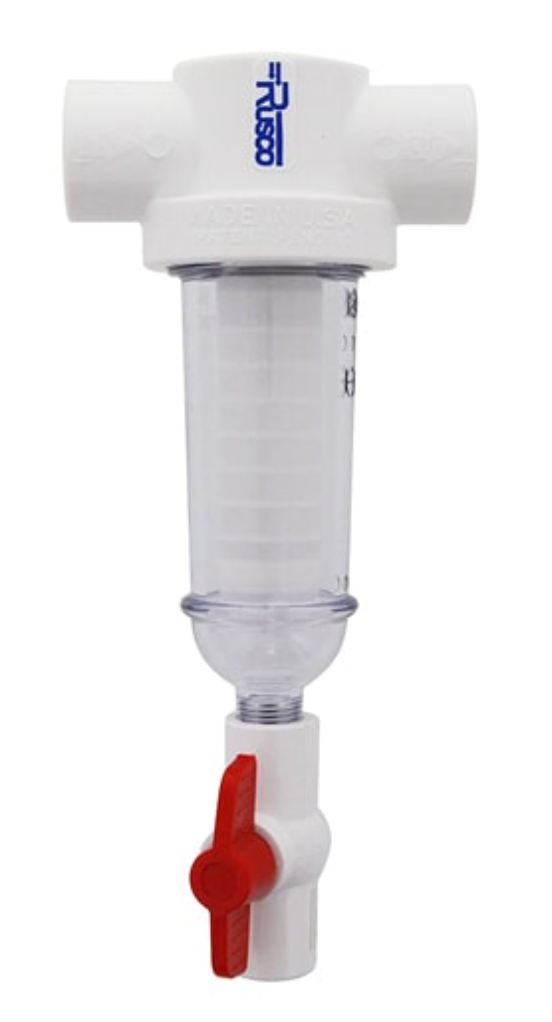





![[7 Helpful] Water Softener Drain Line Discharge Options 25 Water Softener Drain Line Discharge Options](https://waterfiltercast.com/wp-content/uploads/2023/01/Water-Softener-Drain-Line-Discharge-Options-768x448.jpg)

![How long Do Water Softeners Last? +[Extending lifespan] 27 How long Do Water Softeners Last](https://waterfiltercast.com/wp-content/uploads/2020/10/How-long-Do-Water-Softeners-Last.jpg)

I just added this feed to my bookmarks. I really like reading your posts. Thanks!